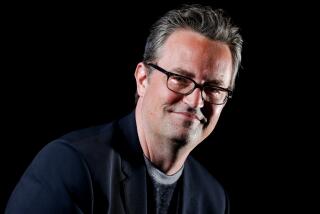First Lady Urges TV, Film Industry to Help Youths ‘Say No to Drugs’
- Share via
First Lady Nancy Reagan implored the television and motion picture industry Friday “to be passive no longer” about drug abuse and to use the media’s considerable influence “to help our young people say ‘no’ to drugs.”
“What I’m asking is that you not collaborate in the illusion that drugs are fun,” Mrs. Reagan said in a keynote address before members of the Academy of Television Arts and Sciences. “What I’m hoping for in addition is that some of you will lead the way in presenting characters who firmly reject drugs in any form.”
The First Lady’s lunchtime speech kicked off a two-day symposium on substance abuse, which continues today as part of an industrywide effort to deglamorize the portrayal of drug and alcohol use on television. Friday’s event, part of the TV academy’s monthly Forum Luncheon series, drew a sold-out crowd of 1,300 to the Beverly Hilton.
After the luncheon, Mrs. Reagan met privately with two dozen TV and film executives to discuss ways in which the industry can join the fight against drug abuse, which she has made her personal crusade during President Reagan’s term in office.
Television Fare
Academy President Richard H. Frank, who is also president of Walt Disney Studios, said in an introductory speech that the point of the industry’s efforts was not to have producers churn out by rote television fare with specific anti-drug themes.
“What is needed,” he said, “is an ongoing message of the problem that will be reflected in everything that is produced for television.”
In her speech, Mrs. Reagan suggested that the film industry is lagging behind television in its efforts. She cited the films “Desperately Seeking Susan” and “Short Circuit” as two otherwise enjoyable films that unnecessarily depicted marijuana use either gratuitously or in a manner that might encourage imitation by young people.
“No one is advocating censorship,” she said.
But, she added, “Hollywood can’t say, ‘Yes, we have the power to influence what clothes a young person wears, but not the power to influence what the person thinks about drugs.’ ”
In response to questions from the audience, Mrs. Reagan added that she did not favor a drug-rating label for films nor does she believe that drug testing for actors should be mandated.
Mrs. Reagan acknowledged in her speech to the TV academy “the progress your industry has made” in combatting drug use. But she urged the audience of writers, producers, actors and executives to step up their efforts.
One “uncreative” recurring scene that could be readily eliminated from the television screen, she cited as an example, is the practice of characters “offering someone a drink or pouring one for themselves” the instant they appear on screen.
“You know and I know that’s the easiest way to get a character from one side of the room to the other,” she said.
Many producers privately say they believe they are individually responsible in their handling of drug and alcohol use. In addition, all three major networks have stringent broadcast standards that prevent the glamorization of drug use and eliminate drug humor.
But the reception for Mrs. Reagan’s message nonetheless was enthusiastic, with standing ovations before and after her speech.
“As vigilant as we’ve been--and we’ve been extremely vigilant--there’s always room for improvement,” said “Moonlighting” executive producer Glenn Gordon Caron, speaking about the industry at large and its reaction to the anti-drug campaign.
Meeting with Mrs. Reagan at the private, post-luncheon meeting, were, among others, Jack Valenti, president of the Motion Picture Assn. of America, and studio chiefs Barry Diller (Fox Inc.), Michael Eisner (Walt Disney Co.), Lew Wasserman (MCA), Frank Mancuso (Paramount) and Lee Rich (United Artists).
Valenti said after the meeting that the film industry now will likely be less tolerant of drug use among its own members.
He said: “If somebody is abusing (himself) with drugs on a picture that is costing $20 million, I think there’s going to be a less-lenient attitude” on the part of the studios.
Writers and Actors
But Valenti added that on-screen attention to drug use should be “a voluntary thing where you raise the consciousness of producers, writers and actors.”
Frank added that “some of the decisions we’re going to make are going to hurt us economically.”
He noted that motion pictures may be slower to change than television, because movies are intended to appeal to a more selective audience, while TV is readily available to viewers of all ages.
Mrs. Reagan’s Hollywood appearance came four days after President Reagan signed into law a $1.7-billion anti-drug program and saluted his wife for having “mobilized the American people.”
Frank called her “the leader of this fight (against drugs) in America,” in explaining why he had invited her as guest speaker. Her personal anti-drug campaign is noted for its increasingly familiar slogan, “Just Say ‘No,’ ” inspired, the First Lady said, by her advice to a youngster who asked her what to do if offered drugs.
More to Read
The biggest entertainment stories
Get our big stories about Hollywood, film, television, music, arts, culture and more right in your inbox as soon as they publish.
You may occasionally receive promotional content from the Los Angeles Times.










